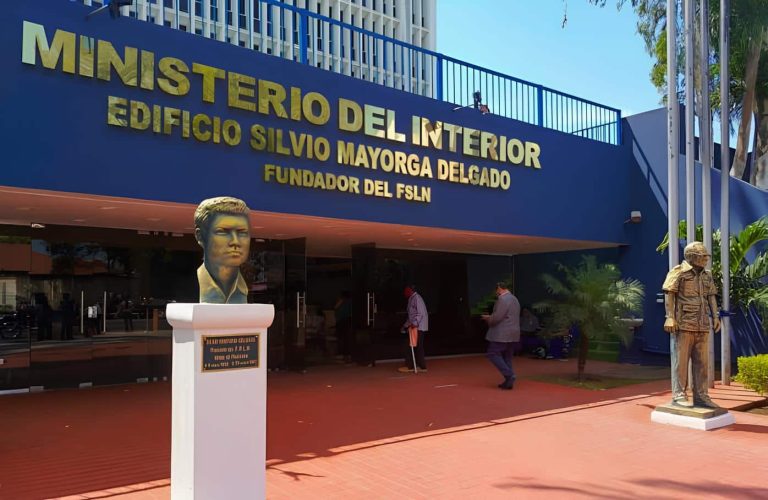25 de agosto 2024

Children of Exile: The Births “Sowing Hope” in the Camp of Nicaraguan Farmers

PUBLICIDAD 1M
PUBLICIDAD 4D
PUBLICIDAD 5D
Massive closures have a widespread impact on society. Even Sandinista organizations have not avoided closure, as regime seeks control of all projects

Facade of the resuscitated Ministry of the Interior, formerly Ministry of the Interior, in Nicaragua // Photo: Taken from El 19 Digital
The dictatorship of Daniel Ortega and Rosario Murillo has eliminated over 70% of the non-profit organizations that previously existed in Nicaragua, according to Confidencial’s tally. Of the 7,227 NGOs that were in existence up until 2017, 5,232 have been shuttered – 162 because they requested “voluntary dissolution,” and the rest forcibly annulled by the government.
Following this massive closure of NGOs, there are only some 2,000 left in Nicaragua, and possibly not all of these are even active, estimates Ana Quiros, former director of the Center for Health Information and Consulting Services (CISAS), the very first of the organizations to be cancelled and confiscated in 2018.
In the latest attack on August 19, 2024, 1,500 organizations were eliminated in one blow. The Ministry of the Interior accused all of them of “not reporting” their financial statements for periods ranging from one to thirty-five years. The massive and indiscriminate closure included associations of Evangelical Protestants, Catholics, social organizations, equestrians, entrepreneurs, educators, health workers, indigenous people, athletes, Sandinista veterans, lawyers and animal rescue.
This massive closure of social organizations in Nicaragua has “a large political and social impact,” states Silvio Prado, a Nicaraguan sociologist and researcher on topics of citizen participation and civil society. “The disappearance of that network of associations in our country, brings with it the disappearance of the fundamental element that makes up the fabric of civil society, which is the fabric of associations,” he warns.
Prado also points to “an economic and social impact” caused by the closure of organizations. This process has been accentuated by a bill steamrolled through Nicaragua’s National Assembly on August 20, to reform the laws that regulate the NGOs. Among other things, these reforms force the organizations that are still active to work in partnership with the government.
“There’s an economic and social impact, in that it eliminates the organizations’ possibilities of implementing projects for the development or welfare of the communities where they were working,” Prado explains.
In addition, he sees an “impact in the political culture, since this type of action on the part of the regime causes citizens to lose interest in getting together to promote their local causes and interests.
Silvio Prado and Ana Quiros coincided in their view that the Ortega regime’s new assault on the non-profit organizations is aimed at consolidating their political control over civil society.
“With this project to demand partnership, what [the dictatorship] wants is to eliminate the sphere of collective action, as well as the sphere of autonomy; but especially the sphere of counter-power, which is that which comes from society and presents a counterweight to the actions carried out by the public powers, in accountability, in control, in denunciation,” Prado explained.
Ana Quiros notes that the reforms to the laws regulating the NGOs in Nicaragua eliminate the autonomy that the organizations had over their projects and represent the regime’s attempt to impose “absolute control” over the organizations of civil society: “no longer just on their freedom of speech, or over what they do, but also over the funding that they manage.”
Following the passage of reforms to the laws for the Regulation and Control of Non-profit Organizations (Law #1115); the Regulation of Foreign Agents (Law #1040); and the Tax Concertation (Law #882); the NGOs are obligated to present to the Interior Ministry their proposals for “programs and projects in partnership.” Said proposals will be evaluated and the government officials will decide to accept or reject the initiative.
“In addition, with these reforms all the NGOs, churches, schools, and charitable organizations “will be neither the object nor the subject of fiscal exemptions, exonerations or other tax benefits” in Nicaragua.
Quiros explained that eliminating the tax exemptions automatically raises the operational costs of the organizations in the country. However, she notes that historically exemptions for the non-religious NGOs have been “limited.”
She recalled that the elimination of the tax exemptions is one of the recommendations the International Monetary Fund (IMF) made to the Ortega-Murillo regime in their Article 4 Mission Evaluation Memorandum.
“[The IMF] wasn’t pointing to the exemptions for civic associations, but to another type of exemptions granted by the government – exemptions much more arbitrary and capricious. These will probably be maintained, because they have to do with political favors,” Quiros comments.
She criticizes, however, the fact that at the beginning of 2024, “the IMF applauded the increased regulation of civic associations (in Nicaragua), even though this meant the elimination of a great many” NGOs. That’s the reason that the regime “has informally been pointing out that these eliminations are being carried out in accordance with the orientations of the International Monetary Fund, although that’s really not true,” Ana Quiros underlined.
This article was published in Spanish in Confidencial and translated by Havana Times. To get the most relevant news from our English coverage delivered straight to your inbox, subscribe to The Dispatch.
PUBLICIDAD 3M
Confidencial es un diario digital nicaragüense, de formato multimedia, fundado por Carlos F. Chamorro en junio de 1996. Inició como un semanario impreso y hoy es un medio de referencia regional con información, análisis, entrevistas, perfiles, reportajes e investigaciones sobre Nicaragua, informando desde el exilio por la persecución política de la dictadura de Daniel Ortega y Rosario Murillo.
PUBLICIDAD 3D